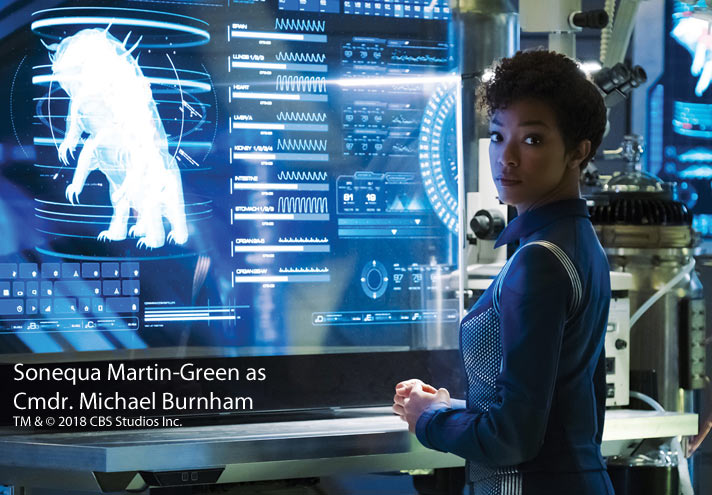The Unfettered Critic – March 2018
We aren’t enamored of streaming services.
We don’t object to them. We just haven’t felt the need to sign up for “additional services.” We like network TV—free TV—although we know its future is shaky. So we tried to delay the inevitable…
…At least, until last fall, when we signed up for CBS All Access, a subscription video-on-demand service owned by broadcaster CBS. At present, All Access doesn’t carry much newly produced content (they promise more down the road). Their inventory consists primarily of episodes from classic television series in the CBS/Paramount Pictures libraries. That gives them loads of content—but it isn’t old episodes of I Love Lucy that we’ve signed on for.
What dragged us in, metaphorically kicking and screaming, is Star Trek: Discovery, the first new Star Trek series in over a decade.
As you likely know, Star Trek looms large in our legend. It’s important to our lives and, occasionally, to our mortgage payments. We write books about it, and we chat about it as guest speakers at media conventions. How could we skip a new show?
Happily, Discovery is quite good, with visual effects and production values far beyond the budget limits of most produced-for-broadcast television series. The storytelling is refreshingly untraditional, while at the same time remaining consistent with the rest of the franchise’s historical canon.
So what’s Discovery about?
Set approximately ten years before Captain James T. Kirk embarked upon his “five-year-mission” aboard the Starship Enterprise, Discovery depicts a volatile period in future history. The Klingons—those fierce bad guys of Kirk’s era—are at war with the United Federation of Planets and the Federation’s Starfleet defense forces. At ground zero for the conflict is an officer named Michael Burnham (played by the amazing Sonequa Martin-Green), a human female raised by Vulcans. Her reckless actions trigger the Klingon war and cause the death of her captain (talented actress and martial arts master Michelle Yeoh). Burnham is court-martialed and sentenced to life in military prison. But during a prison transfer via space shuttle, an emergency situation necessitates the shuttle’s rescue by an experimental starship, the U.S.S. Discovery, captained by the enigmatic Gabriel Lorca (Jason Isaacs). Lorca recognizes Burnham’s capabilities as a science specialist…and perhaps something else. He recruits her to work with his crew on a classified project that could end the war.
There are a lot of firsts here: the star of the show is an antihero—a repentant mutineer. And Lorca isn’t your typical noble Starfleet captain. His motives seem…murky.
The original Star Trek made history by introducing us to unexpected characters in major roles: a black female communications officer; an Asian helmsman; a Russian navigator. Discovery is full of such unexpected casting, going beyond racial differences (which are plentiful). Lieutenant Paul Stamets (played by Broadway thespian Anthony Rapp) is in an onboard relationship with another male. They kiss on camera and even brush their teeth together before retiring for the night. O brave new world!
And there’s a strong female presence on Discovery. Besides Martin-Green and Yeoh, you’ll find the delightful Mary Wiseman as Burnham’s chatty bunkmate Tilly, and feisty Mary Chieffo as L’Rell, the smartest Klingon present. Reportedly, this untraditional focus has perplexed some traditional (male) fans, who wonder what’s happened to good old Star Trek.
We, however, couldn’t be happier. Star Trek: Discovery is sometimes dark with wartime violence, but the overall storyline is consistently clever and entertaining. We love being surprised by each twist.
So we have no regrets about being dragged into the future. Who knows—someday we may even sign up for Netflix.

 Paula and Terry identify as writers, with an ever-increasing number of published works to support the supposition. They live a primarily pastoral life in the enchanted town of Jacksonville.
Paula and Terry identify as writers, with an ever-increasing number of published works to support the supposition. They live a primarily pastoral life in the enchanted town of Jacksonville.